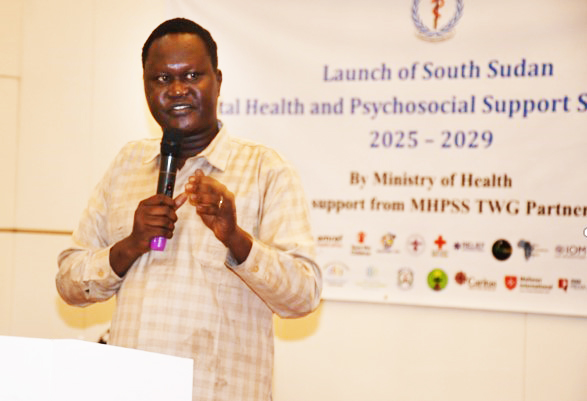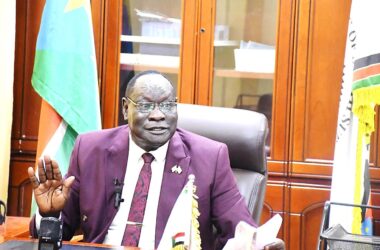By Alan Clement
The Chaplaincy Corps of the Ministry of Defence has called for the inclusion of the security sector in South Sudan’s new National Mental Health and Psychosocial Support Strategic Plan (2025–2029).
The Corps emphasized that the mental health needs of uniformed personnel must be formally integrated into the strategy to ensure long-term stability and resilience within the armed forces.
Speaking at the official launch of the National Mental Health and Psychosocial Support Strategic Plan on Saturday, Dr. Michael Deng de Monychol, Deputy Director for Mental Health at the Ministry of Defence, revealed that a recent internal study found over 78 percent of men in uniform suffer from post-traumatic stress and anxiety disorders.
“Our men in uniform are having mental health needs and they are neglected,” said Dr. Deng of the Defence Chaplaincy Corps.
He urged stakeholders to include the Ministry of Defence in the country’s new mental health strategy, saying, “As I stand here today, I invite all of you to ensure that the Ministry of Defence is also considered in this strategic plan.”
Dr. Deng, a clinical psychologist, underscored the need for expanding mental health and psychosocial services to military personnel and veterans, noting that trauma and stress from years of conflict continue to impact their well-being.
“These are our brothers and sisters who sacrificed themselves to protect this country. Their mental needs must also be taken care of whether by their families, institutions, or supporting agencies,” he stressed.
He called on the Ministry of Health to strengthen collaboration with the Defence Ministry and support the military hospital’s mental health unit, which currently relies on limited assistance from the International Committee of the Red Cross (ICRC).
He also urged the government to license clinical psychologists, who remain excluded under current medical registration laws.
“We need training of counsellors, psychosocial support officers, and psychiatrists,” Dr. Deng said.
Dr. Alier, Director General for Medical Services, echoed the call, noting at the same event that mental health remains one of the most neglected areas in the health sector and urged stronger collaboration among partners to address the gap.
“The issue of mental health affects all categories of society. I appeal to the education authorities, welfare institutions, security agencies, and lawmakers to collaborate with the Ministry of Health in implementing this plan,” Dr. Alier said.
Dr. Kennedy Ganiko, Undersecretary in the Ministry of Health, stressed the importance of evidence-based planning and called for mental health assessments across all government institutions.
“We need to understand where we are and fill the gaps,” he said, urging partners to continue supporting the rollout of the strategic plan.
The National Mental Health Strategic Plan was launched as part of World Mental Health Day 2025 celebrations, held under the theme “Access to Mental Health Services during Crisis and Emergencies.”
As the country moves forward, stakeholders are calling for inclusive implementation that reaches all sectors including the armed forces ensuring no one is left behind in the pursuit of mental well-being.



